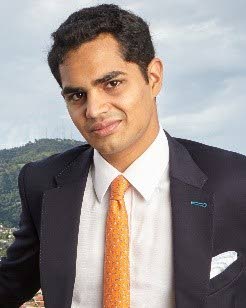Caricom can broker a solution in Venezuela

Kiran Mathur Mohammed
kmmpub@gmail.com
“How will I ever get out of this labyrinth!” were the reputed last words of Latin American liberator Simon de Bolivar. Chaos reigns in Venezuela. In the past week, the Venezuelan opposition has been recognised as the legitimate government by most South American countries and the US which has sanctioned the oil exports that are President Nicolas Maduro’s lifeline. The EU has called for elections to be announced in days or it will do the same. The opposition has called for the military to intervene.
Amidst this, long-time supporters Russia, China and Cuba have come to Maduro’s aid. Caricom and TT have toed the line- invoking state sovereignty and continuing to recognise Maduro whilst calling for dialogue.
What is in our national interest? Preserving the Dragon gas deal: worth up to 300 million cubic feet of gas per day. Containing the humanitarian crisis that has seen tens of thousands of refugees flee to TT (Refugee International estimates 40,000). Preventing an unstable Venezuela from deterring investors and raising the cost of capital for our international issuances. And stopping newly emboldened pirates and drug smugglers from terrorizing our coastline. Not to mention arresting the increased provocation in Guyana.
It is also in our interest that Venezuela regains its place as a prosperous and free trading partner. Human rights underpin economic growth. Three universities show that the average Venezuelan lost 24 pounds last year, according to a Reuters report. There are no famines in democracies.
The US is our most important ally. And its Secretary of State Mike Pompeo has called for countries to “pick a side” whilst the Ambassador to TT has called our continued recognition: “deeply concerning”.
How can we walk this tightrope? That depends on how the situation in Venezuela is likely to unfold.
Venezuelan top brass (if not the rank and file) still stand behind Maduro. China and Russia have invested billions in the regime. It has used this funding, as well as control over state oil company PDVSA to solidify the backing of senior officers. President Maduro also benefits from the support of Cuban and Russian counter-intelligence operatives. Oil sanctions may not be as biting as they seem. Shipments can be re-routed to Asia and sold at a discount. Despite promises of amnesty, game theory suggests that senior officers have little incentive to defect to the opposition, as professors Bruce Bueno and Alastair Smith have pointed out.
What could change the equation is fear of direct US backing for a coup, targeted strikes or a full-scale invasion; or enticement in the form of large amounts of US aid.
The likelihood of a coup therefore depends on the credibility of an American threat to actively support one through covert operations, materiel or financial and communications support. Given its cost in blood and treasure, an intervention appears at first in-credible. According to Frank O’Mora, former deputy assistant secretary of defence – an invasion would require 200,000 troops – more than Iraq. Even targeted strikes would require a subsequent ground presence to prevent the onset of anarchy.
That said, President Trump’s unpredictability is a strategic advantage for the US and makes that unlikely possibility a real threat for the Venezuelan regime. Pompeo has said: “all options are on the table”.
I spoke with Liz Alarcon, a Latin American expert who has been closely speaking to US House Representatives and Venezuelan actors. She says this time is different. The Venezuelan opposition is finally united. And unlike previous US interventions, this one is backed by fellow Latin American governments.
Caricom has invoked sovereignty. Indeed, many Latin American countries do not see support for Juan Guaidó as a violation of Venezuelan sovereignty so much as a restoration of their own sovereignty – which has been infringed upon by the influx of 2.3 million Venezuelan refugees.
Staying on the fence risks upsetting the Americans in the same year that the Caribbean Basin tariff agreement is being renewed; as well as putting us in a difficult position in the event of regime change. Recognising Guaidó involves backing an as-yet uncertain opposition and risks scuttling our gas deal with Venezuela.
Given this, Caricom brokering a deal between Maduro and the Guaidó-led opposition is the best option. We are in the almost unique situation of retaining credibility with the Maduro regime whilst being a strong ally of the US. Even if we fail we will restore our relationship with the United States and the Venezuelan opposition – whilst maintaining one with Maduro. If we succeed we will improve the lives of millions of Venezuelans. Caricom must now ensure any negotiation is credible and not just a way for the regime to buy time. Talks must give the Venezuelan government and military a face-saving way out; whilst paving the path to an orderly transition that returns freedom to the Venezuelan people. It is in our own interest.
Kiran Mathur Mohammed is a social entrepreneur, economist and businessman. He is a former banker, and a graduate of the University of Edinburgh.

Comments
"Caricom can broker a solution in Venezuela"